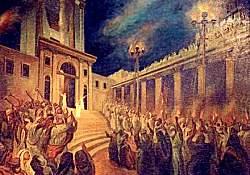Rosh HaShana
The origin of Rosh HaShana, the Jewish New Year, is Biblical (Lev. 23:23-25): "a sacred occasion commemorated with loud blasts (of the Shofar, the ram's horn)." The Bible refers to the holiday as Yom Teruah (the day of the sounding of the Shofar) and Yom Zikaron Teruah (the day of remembering the sounding of the Shofar).

In Talmudic times, Rosh HaShana became a celebration of the anniversary of the world's creation and a day of self-examination, repentance and judgment. While the day was called Yom HaZikaron (Day of Remembrance) and Yom HaDin (Judgment Day), the name Rosh HaShana (Head of the Year) which was first used in the Mishnah has become the most prevalent.
Rosh HaShana is both a solemn and happy day. It is a time for introspection, asking for forgiveness, giving forgiveness, resolving to do better, remembering God is King and Judge, and praying for a healthy and happy year to come. Those observing the Jewish New Year are solemn in their repentance, but happy in their confidence that God is merciful and good.
On Rosh Hashanah, Jews listen to the shofar blown during lengthy prayer services, eat holiday meals, and do no work. After repenting for bad deeds through prayers, they symbolically cast off sins through the Tashlich ceremony.
Yom Kippur
Yom Kippur, literally "Day of Atonement," is the holiest day of the Jewish year. Yom Kippur is a day of "self-denial" (Lev. 23-27) so that we may be cleansed of our sins. It is observed eight days after Rosh Hashanah. It is believed that on Rosh HaShana God inscribes all of our names in the "books", and on Yom Kippur the judgment entered in these books is sealed. The days between Rosh HaShana and Yom Kippur are called the Days of Awe. Yom Kippur is, essentially, our last chance to demonstrate repentance and change the judgment.
No comments:
Post a Comment